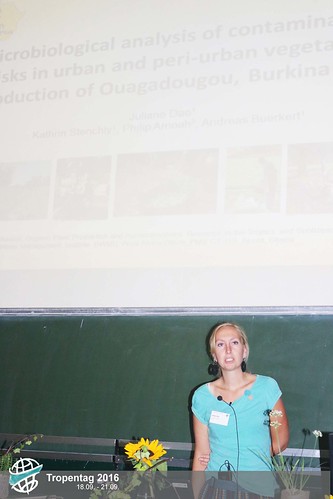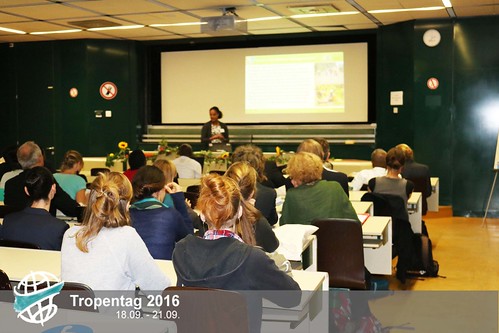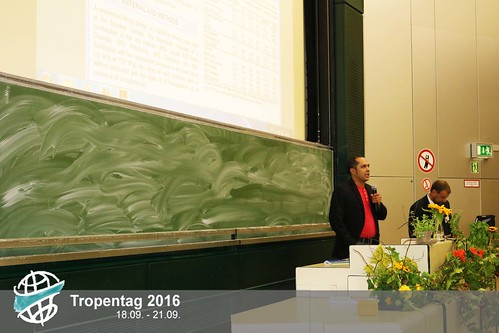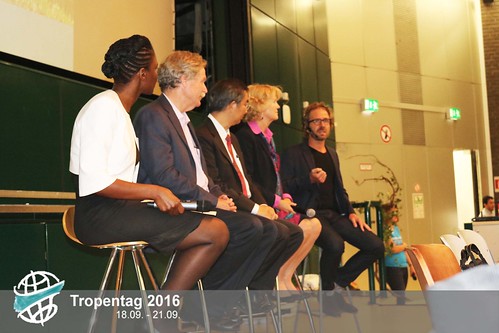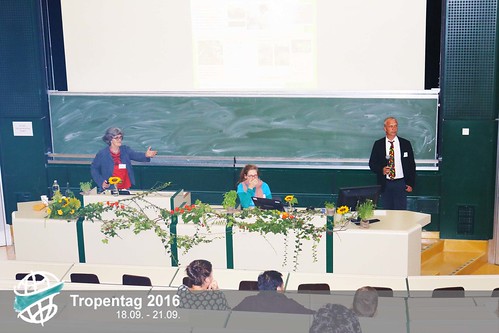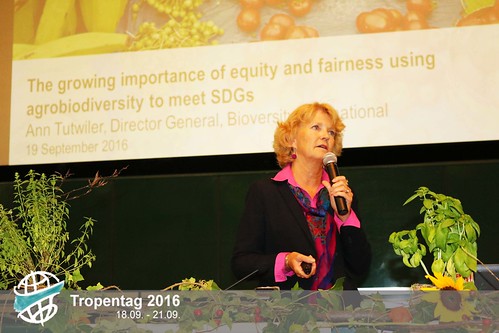Elsby's blog
Keynote Speech Videos
Wed, 09/21/2016 - 10:14 — ElsbyOnce again, if anyone happened to have missed Monday's Keynote speeches from David Molden (Sharing Hindu Kush Himalayan Resources in a Changing World), Poonpipope Kasemsap (Solidarity in a Competing World and Food Security Challenge), and Ann Tutwiler (The Growing Importance of Equity and Fairness using Agrobiodiversity to meet SDGs), please take a look at the professional coverage of the presentations on youtube!
David Molden's presentation:
Poonpipope Kasemsap's presentation:
Ann Tutwiler's presentation:
Climate Change and Our Beloved Fruit Trees
Tue, 09/20/2016 - 18:42 — ElsbyA concerning fact that stood out during the presentation on lettuce contamination in Burkina Faso along the value chain was that 70% of the water being assessed in the study was above the safety or “health based target” threshold as set out by the World Health Organization. This water is being used to irrigate crops in urban and peri-urban locations, and is often derived from sewage contaminated sources.
Lettuce is an important crop in this area as it is considered “exotic” and has high value, especially during wedding season and other important occasions. Conserving its hygiene along the value chain is critical in preventing the food-borne illnesses that are all too frequent when using coliform-polluted water as an irrigation source.
"Being a Woman Farmer is Like Being Cursed"
Tue, 09/20/2016 - 16:01 — ElsbyThe opening oral presentation in the gender section this afternoon, Tuesday 20th, offered a bold statement: “being a woman farmer is like being cursed”. As a woman, and a farmer (albeit in a developed country), this topic especially intrigued me.
The main message from this session was that women in the global south are often inadvertently overburdened by work and life tasks as a result of well-intended gender equality policies. I think this rings true for women worldwide, in different ways.
A commenter from the audience recalled seeing women being given toasters and other small appliances as Mother’s Day and birthday gifts. And while these appliances made domestic life easier, it created more pressure and expectations for women to become gastronomical chefs. It seems that so many well-intended inventions and “advancements” have the unwanted result of making women’s lives more difficult.
Tuesday's Rice Session
Tue, 09/20/2016 - 11:49 — ElsbyTuesday morning’s poster sessions included informative presentations on one of the world’s most important crops: rice! As a Canadian, I know very little about rice, so I was either the worst person for this reporting job, or the best (as I had a lot to learn!).
A few common presentation themes included nutrient management, tillage practices, and water conservation. Most of the research projects took place in African and Asian countries, but Colombia also made an appearance. It seemed it could be agreed upon that there is a need for innovative water management strategies, cover cropping systems, and an increase in knowledge of nutrient cycling.
Nitrogen topics were recurring throughout the session, including a particularly interesting presentation that informed the audience of the horizontal movement of nitrogen in valley growing regions. It was said that as the year’s first spring rains land on the soil, microorganisms are essentially “woken up”, and an unused surge in microbial activity and thus nutrient availability occurs. With no crop planted in the field during this time, many nutrients are lost in the spring rains and runoff. Cover crops could help to mitigate this effect.
"Why do the poor continue to stay poor?"
Tue, 09/20/2016 - 09:17 — ElsbyKeynote Discussion Round
This is arguably the most important part of any public presentation – the opportunity for the audience to engage, comment, and challenge the speakers.
The comment that really stuck out to me from the audience was an attendee from Ghana, who countered the optimism of the presenters by asking “Why do the poor continue to stay poor?”. This is obviously a tough question to try and answer, as no single person or country is responsible for this continued global injustice.
Another comment from the crowd stated that “solidarity has come a little late…but is still welcome”. This is an important reminder that there may still be some resentment circulating between the North and South concerning any possible exploitation or injustice that citizens of developing countries may have experienced.
Crop Diversity Poster Session - Amaranth for the Win
Mon, 09/19/2016 - 19:45 — ElsbyThe first round of poster presentations took place this evening, with “Crop Diversity and Plant Breeding” showcasing its inaugural topics. Many the research projects of the session, including a handful of Master’s degree theses, such as an Andean tuber crop that can be used to treat diabetes; the amaranth plant which has religious Mayan significance; and sage genetic diversity, known for its seed oil uses.
One poster which stood out to me was the “unconventional vegetable” amaranth, presented by Roland Schafleitner. This plant can be used as both a grain and vegetable product, although it is highly perishable as the latter. This plant is popular in Africa and Asia, but no breeding research is currently being undertaken. It presents an opportunity for crop breeding and innovation, as well as collaboration between project cooperators (which the presenter is actively searching for!). It is an especially good research subject for genetic diversity as it is a C4 plant (resistant to heat and drought), and can produce new generations (and seeds) relatively quickly.
First Words from Tropentag 2016 Keynote Speakers
Mon, 09/19/2016 - 19:00 — Elsby“Population is rising, and we must therefore produce more.” – Michael Hauser, this year’s keynote session moderator.
Tropentag 2016 kicks off with keynote speeches from three prestigious experts in the world of food security and science. These speakers set the tone for the conference and give the first insights into this year’s topic: solidarity in a competing world – fair use of resources. This is an exciting opportunity to hear words from experts and scientific contributors from around the globe, including Italy (and the United States), Thailand, and Nepal!





